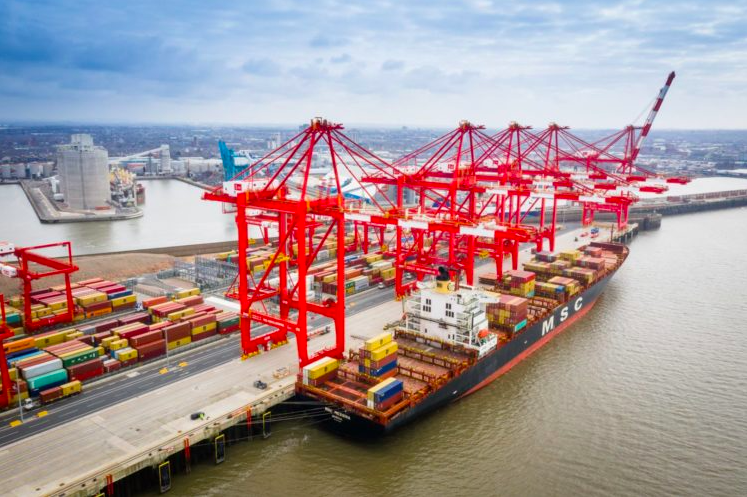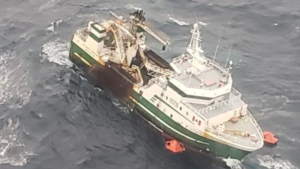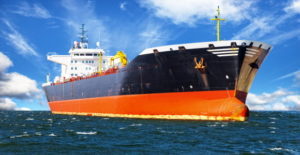Locations of England’s eight freeports announced

The locations of eight new freeports in England have been announced.
Freeports are usually located around shipping ports, or airports.
Goods that arrive into freeports from abroad aren’t subject to the tax charges (tariffs). Taxes are only paid if the goods leave the freeport and are moved elsewhere in the UK. Otherwise, the goods are sent overseas without the charges being paid.
After around 30 areas bid to become a freeport, chancellor Rishi Sunak announced that the eight new freeports, which will begin operations from late 2021, are:
- East Midlands Airport
- Felixstowe and Harwich
- Humber region
- Liverpool City Region
- Plymouth
- Solent
- Thames
- Teesside
The UK had seven freeports between 1984 and 2012, says the BBC. Currently there is one on the Isle of Man.
Sunak hopes freeports will help regenerate deprived areas.
They have “different rules to make it easier and cheaper to do business,” he says.
In England, companies inside the sites will also be offered temporary tax breaks, mostly lasting five years.
These include reductions to the tax companies pay on their existing property, and when they buy new buildings. Employers will also pay reduced national insurance for new staff.
“Our freeports will have simpler planning to allow businesses to build, infrastructure funding to improve transport links, cheaper customs with favourable tariffs, VAT or duties and lower taxes – with tax breaks to encourage construction, private investment and job creation,” says Sunak.
Southampton teamed up with Portsmouth as part of a south coast freeport bid.
Solent LEP, which made the bid, says the proposal has the potential to attract £2bn investment and create 52,000 jobs; through opening the potential to bring tax reliefs, simplified customs procedures and streamlined planning processes to promote regeneration and innovation.
“The Solent has a very proud maritime heritage, but we don’t live in the past,” says chair of the Solent LEP, Brian Johnson. The “announcement represents the start of a new era for the Solent as we begin our work with government to create jobs, drive innovation and build sustainable, long-term opportunities now and in the future.
“As the nation’s global gateway, the Solent freeport will be critical to ensuring that the UK can remain competitive on an international stage in the years ahead. The LEP is committed to ensuring that our local communities – and in particular our young people – can benefit from the opportunities created.”
“All of the team at Portsmouth Harbour Marine are delighted to hear the wonderful news about the establishment of the Solent Free Port,” says Richard Powell, Portsmouth Harbour Marine‘s chairman.
“It will bring a much needed and most welcome boost to employment in the marine sector in the Solent area. We commend all those involved in achieving this important success and look forward to working together to develop the new opportunities it presents.”
Bids in England were scored against different criteria, says the BBC. One of the most important, according to the government, was to show how a freeport could bring economic opportunities to poorer regions and ‘level-up’ the country.
Supporters say freeports can help increase manufacturing, and encourage jobs and investment in areas that would otherwise struggle to attract them.
But critics say their impact is minimal and they can act as tax-avoidance sites for the super-rich.
There have been fears raised that free ports could be turned into high-end security compounds to allow owners to import and store luxury goods without facing customs charges, according to the Daily Mail.
The paper says Le FreePort in Luxembourg is said to act as a maximum security centre for the super-rich to store art, fine wine, vintage cars and other treasures.
There are currently about 80 freeports dotted around the EU.
Research by consultancy and construction firm Mace (2018) concluded that creating seven freeports in the north of England could add £9bn a year to Britain’s GDP and create 150,000 jobs. But, says the Daily Mail, critics question this figure, saying much of it would just be redistributing economic activity from elsewhere in the country.
Never-the-less, the announcement is being welcomed.
“We’re delighted to hear the chancellor’s announcement that the Liverpool city region’s bid to become a freeport has been successful,” says Anthony Hatton, director of strategic projects for Peel L&P.
“We’re proud that our Wirral Waters and Port Salford developments have helped to strengthen the case. As a hub for global trade and investment, the freeport will promote levelling-up through regeneration, attracting foreign investment, creating new jobs and facilitating innovation, particularly in low carbon technology.
“Wirral Waters is a nationally significant regeneration site that will support manufacturing and, through the creation of a £23m maritime knowledge hub, will be a focus for dedicated maritime and decarbonisation innovation. The inclusion of our Port Salford tri-modal freight facility and distribution park will provide an inland customs site with rail access to the Port of Liverpool and the West Coast mainline.”
Tudor Evans, leader of Plymouth City Council, tweeted that freeport status could bring thousands of jobs to the city and more than ‘£100 million in investment’.
Tim Morris, chief executive of the UK Major Ports Group, says that ‘ambitious and exciting bids’ have been recognised.
“However, freeports alone are not a silver bullet for addressing deprivation in coastal communities,” Morris says.
“The government should look at extending some of the low-cost, pro-investment measures in the freeports ‘tool box’ to port areas more widely.”
Further announcements are still expected on freeports within the devolved administration.
Image of Port of Liverpool courtesy of Liverpool Business News.










